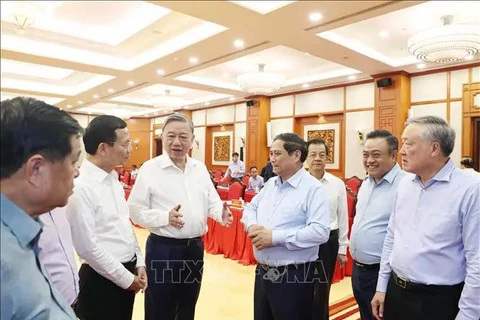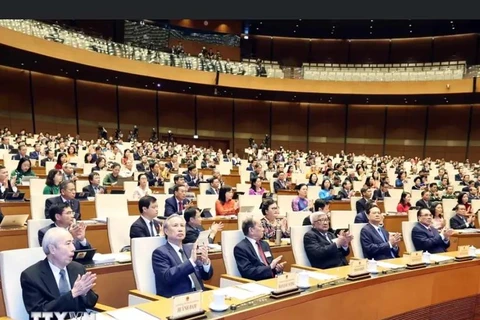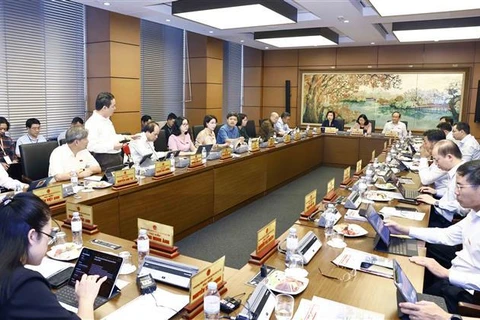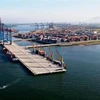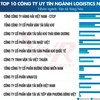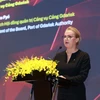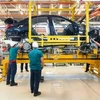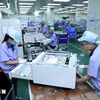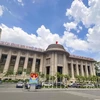
Hanoi (VNA) – Politburo member and Prime Minister Pham Minh Chinh reported on national socio-economic development this year and solutions to accelerate the development in 2025 at a national conference held on December 1.
The event was to launch the review of the implementation of Resolution No. 18-NQ/TW issued by the 12th Party Central Committee.
The PM said all-level authorities, sectors, and localities have grasped the real situation and decisively, flexibly, and effectively adopted tasks and solutions across different fields. In particular, they have prioritised boosting growth while maintaining macroeconomic stability, controlling inflation, and ensuring major balances of the economy.
Focus has been given to implementing the three strategic breakthroughs, especially institutional reform, promoting power decentralisation, reducing and simplifying unnecessary administrative procedures and business conditions that trouble citizens and businesses. Efforts have been made to create momentum and foundation for the development of science and technology at the same time with facilitating entrepreneurship, innovation, and digital transformation.
Additionally, there is an emphasis on developing culture and society, guaranteeing social security; addressing consequences of natural disasters, especially Typhoon Yagi; enhancing national defence and security; combating corruption, negative phenomena, and wastefulness; and stepping up foreign relations as well as integration into the world.
PM Chinh highlighted many significant socio-economic results obtained during the first 11 months of 2024 that, he said, are better than the same period last year in almost all areas. All the 15 main targets are expected to be achieved or exceeded, especially the growth target. The annual growth is estimated at over 7%, making Vietnam among the few posting high growth rates in the region and the world. Meanwhile, macroeconomic stability continues, and inflation is kept below 4%.
By the end of November, total foreign trade is estimated at about 715 billion USD, a 15.3% increase, with a surplus of over 23 billion USD. The whole year's turnover is projected to hit a record of 807.7 billion USD. Foreign direct investment (FDI) remains a bright spot, placing Vietnam among the top 15 developing countries attracting the most FDI globally.
However, he also pointed out several major shortcomings, particularly the institutional bottleneck, noting that investment in financial and human resources for law-making has not matched requirements in reality.
He emphasised that all-level authorities, sectors, and localities must adopt a reformed and breakthrough mindset with strong determination, significant efforts, decisive actions, and timely, flexible, and effective implementation in the spirit of ‘daring to think, daring to act, daring to break through for the common good’.
The PM said the year 2025 has been identified as a year of accelerating, making breakthroughs, tackling difficulties, and surmounting challenges to strive for the highest possible results for the five-year plan 2021-2025.
Specifically, Vietnam targets a GDP growth rate of about 6.5 - 7%; per capita GDP of approximately 4,900 USD; an average consumer price index (CPI) increase of about 4.5%; an average labour productivity rise of 5.3 - 5.4%; along with the household poverty rate under multi-dimensional standards reduced by 0.8 - 1%.
Notably, the Government leader stressed that the country will strive to secure GDP growth of some 8% GDP to create momentum for implementing the 2021 - 2030 plan. Next year, it will work to complete at least 3,000km of expressways, basically finish the Long Thanh international airport project, and eliminate temporary and dilapidated housing nationwide.
Outlining several groups of key tasks and solutions to realise the targets, he first highlighted the need to perfect the institutional framework, streamline the apparatus and enhance its efficiency and effectiveness, and build mechanisms and policies strong enough for cadres to think big, act bold, and dare to take responsibility for common interests.
Second, it’s necessary to continue prioritising growth promotion linked with maintaining macroeconomic stability, controlling inflation, ensuring major economic balances with high surpluses, and keeping and accelerating growth to approximately 8%.
The third group of solutions focuses on mobilising maximum social resources while the fourth promotes the development of strategic infrastructure, especially major and nationally important projects.
Solutions in the fifth group include ensuring electricity supply under all circumstances to meet both immediate and long-term needs for economic activities and consumption.
Sixth, he said, the country will have to push ahead with combating corruption, negative phenomena, and wastefulness.
The seventh group of solutions focuses on boosting cultural development, guaranteeing social security, and proactively coping with natural disasters and responding to climate change.
Mentioning the last but not least solutions, the PM underlined the importance of ensuring political stability, firmly protecting national independence, sovereignty, and territorial integrity, and fostering foreign relations and international integration./.
